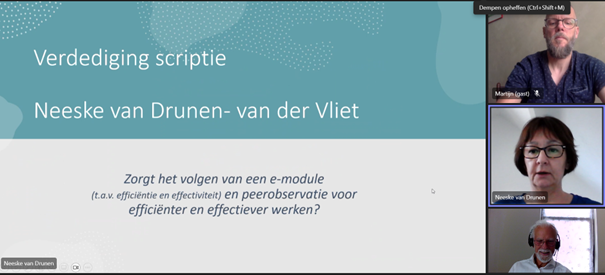On June 20th Neeske van Drunen – van der Vliet successfully defended her thesis for the completion of the program Master of Education (Med) of NCOI. The theme of her signature work was peer observation, knowledge sharing and work efficiency and effectivity in Bernhoven, a regional general hospital in the Netherlands. The reason for this theme was the high work pressure, employee turnover, austerity measures, and skills shortages in healthcare on the labour market. The effect of these developments is that less co-workers have to do more work. Together with that, autonomy of the co-workers increased, so that many have established work routines which differ from others, and working procedures became less well documented. This created the need for more efficiency and effectivity in work processes.
The study was aimed at practice trainers. These professionals have an assignment to provide learning support of trainees or employees in continuing professional development. Because of austerity measures, 8 in stead of 10 of these trainers had to do the same amount of work.
In a pre-study it was found that knowledge sharing was not common in the team of practice trainers. To improve that, a process of peer observation was initiated, accompanied by voluntary participation in an e-learning module. The practice teachers could make a choice out of a series of modules on personal effectiveness.
A four-step approach of knowledge sharing was deployed: 1. pre-observation, 2. observation, 3. post-observation and 4. team knowledge sharing. The pre-observation consisted of the planning of the observation, the observation itself, was done based on pre-specified observation points, the post-observation consisted of analysis, feedback, reflection, and application, and the team knowledge sharing consisted of team meetings in which experiences and insights were presented and discussed. Themes which were observed and discussed were for instance the procedure regarding the training of new interns, the approach of meetings with the team manager, the evaluation of final assessments with external experts, entrustable professional activities, workplace learning, etc.
The evaluation of the results showed more knowledge sharing, consciousness, trust, use of expertise of individuals, coping with challenges, informal learning moments, unambiguity, and smarter work. These are results any organization would want to see as an effect of interventions which are aimed at knowledge sharing, team learning and performance improvement.
Congratulations Neeske with this very interesting thesis, and thanks a lot Dr. Martijn van Schaik for the assessment of this thesis.
Suzan de Kleer Kathelijn Mulders Sandra Boertien Lutz Mischke NCOI Opleidingen NCOI University of Applied Sciences NCOI Learning NTI Salta Group.

